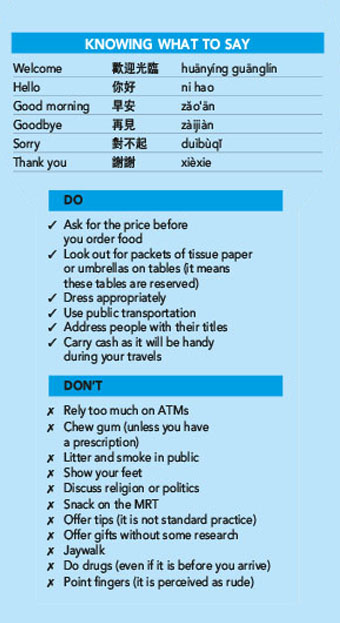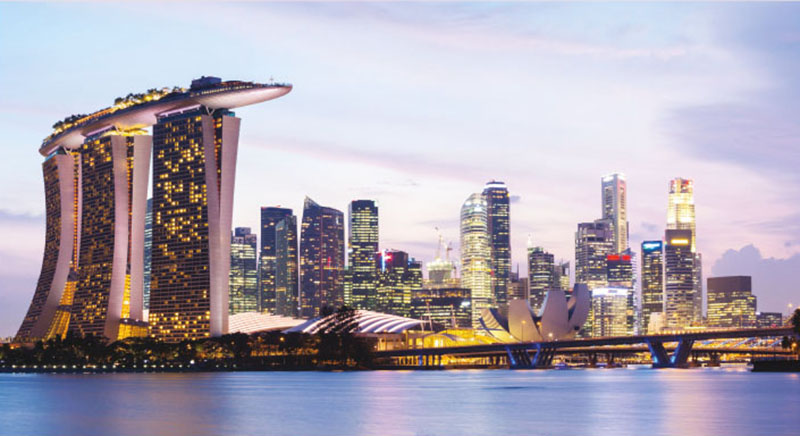SINGAPORE
SOUTHEAST ASIAN BIZ HUB
Singapore’s success story is an example of visionary government policy and planning. The country is where it is today because previous governments planned extensively and followed through on their plans obsessively. As such, having a plan is an important aspect of doing business in Singapore.
Stepping into a meeting requires that background information is researched and known. Facts and figures are important, hyperbole is not valued, and in general being prepared indicates intent and commitment, and appreciation of time.
Whether business travel to Singapore is for investment, expansion or networking, having a plan and being on time are important first steps.
A variety of sectors drive Singapore’s economy, but the country is well-known for its prowess in shipping and ports, electronics, banking and finance, tourism and increasingly, entrepreneurship (particularly in technology and healthcare). However, the country’s economy relies on exports and international trade. In the context of waning global growth, Singapore’s economy grew by two percent in 2016 – and higher growth is expected this year.
For business travellers from Sri Lanka, Singapore holds immense promise.
Firstly, it is the destination of choice for regional headquarters in the Asia-Pacific, outdoing both Hong Kong and Shanghai, which come in second and third respectively. It is estimated that there are between 3,000 and 7,000 MNCs in Singapore with around 150 regional headquarters of Fortune 500 companies. For businesses seeking external investment or expansion into new markets, Singapore could be a starting point.
 Secondly, Singapore has extensive trade agreements with many countries in the region and beyond. Setting up or investing in Singapore will automatically provide access to these regions through trade.
Secondly, Singapore has extensive trade agreements with many countries in the region and beyond. Setting up or investing in Singapore will automatically provide access to these regions through trade.
At present, Singapore has implemented over 20 bilateral and regional FTAs with 31 trading partners from Asia, Europe, South and North America, and Australasia. It is also part of the Trans-Pacific Partnership (TPP) and the WTO. Singapore’s largest trading partners are China, Malaysia, the EU, the US and Hong Kong. Its exports in 2016 totalled nearly SG$ 467 billion while imports reached SG$ 403 billion.
Another aspect that makes Singapore a good choice is the supporting infrastructure to set up, relocate, expand or invest in a new business. This includes affordable financing options from the many banks and fund managers, a favourable tax system for business growth, and the availability of high-speed internet connectivity and highly skilled labour.
As a result of this business friendly environment, 99 percent of all enterprises in Singapore are SMEs, which employ 65 percent of the labour force and account for 47 percent of the country’s GDP. Furthermore, 16 percent of all enterprises are foreign owned.
Singapore also offers expertise in public- private partnerships for the government and public sectors. The country operates two sovereign wealth funds – Temasek Holdings and GIC – which contribute to its economic development and innovation.
There are also incentives for investment in business ventures in the home country. In 2015, Singapore’s direct investment abroad exceeded 665 billion Singaporean Dollars, and the government continues to drive and promote foreign investment.
Getting to Singapore from Sri Lanka is an easy task; it is one of the few countries that offers Sri Lankans a visa on arrival, provided an onward or return airline ticket is purchased. There are multiple flights on various airlines to Singapore daily – and your hosts will recommend hotspots for chilling out after work that include shopping, food and entertainment.






Leave a comment